Singing may bring benefits for patients with Parkinson’s disease

Image: AFP Relaxnews
New preliminary research presented at the Society for Neuroscience 2018 conference this week has shown that singing could improve motor skills as well as the mood of patients with Parkinson’s disease.
Carried out by researchers at Iowa State University, the new pilot study looked at 17 Parkinson’s disease patients attending a therapeutic singing group.
The researchers measured the participants’ heart rate, blood pressure and cortisol levels before and after a one-hour singing session, and asked participants to report on any feelings of sadness, anxiety, happiness and anger.
The results showed that the participants experienced improvements in mood and motor symptoms after singing, as well as reduced physiological indicators of stress.
Although the improvements did not reach statistical significance, and there were no significant differences in feelings of happiness or anger after class, the participants did feel less anxious and sad.
The researchers also added that the improvements seen were similar to benefits of taking medication.
“We see the improvement every week when they leave singing group. It’s almost like they have a little pep in their step. We know they’re feeling better and their mood is elevated,” said researcher Elizabeth Stegemöller, who runs the singing group and who presented the findings at the Society for Neuroscience 2018 conference.
“Some of the symptoms that are improving, such as finger tapping and the gait, don’t always readily respond to medication, but with singing they’re improving,” she added.
The researchers did caution that the findings are preliminary data, with the study being one of the first to look at how singing affects heart rate, blood pressure and cortisol in people with Parkinson’s disease; however, they added that singing as a form of therapy has the potential to be an accessible and affordable treatment option to improve symptoms and quality of life for people with Parkinson’s disease.
The findings also build upon the team’s previous research that singing can help improve respiratory control and the muscles used for swallowing in people with Parkinson’s disease, although they are still unsure what might be causing the behavioral changes found in the new study.
“Part of the reason cortisol is going down could be because the singing participants feel positive and less stress in the act of singing with others in the group,” said co-author Elizabeth Shirtcliff.
Stegemöller also explains some of the benefits found in previous research in a video recorded in 2017, in which she leads a singing group for people with Parkinson’s disease. The video below can be found online on YouTube:
Previous research has also found that various forms of artistic therapy can benefit different health conditions, with creative pursuits such as drawing, coloring, and clay modeling found to reduce stress, and a 2015 study suggesting that music therapy as part of palliative care can increase relaxation and reduce fatigue.
Just last month, a group of Canadian doctors announced they would start prescribing free art gallery visits as part of a new pilot program to assess the benefit on health and well-being. JB
RELATED STORIES:
Longevity connected to number of neurons rather than body size, says study
Manipulative, disruptive ads in mobile apps lure, target children